Abstract
Studies of reaction time in Parkinson's disease (PD) have suggested a selective deficit in simple reaction time (SRT), compared with choice reaction time (CRT). This finding has been interpreted as a deficit in motor preprogramming but could involve other factors, such as attentional focussing and stimulus predictability. Moreover, not all studies show the same selective deficit, possibly because of differences in patient selection and treatment effects. The neurochemical basis of RT deficits in PD remains unclear. Accordingly, the contribution of cognitive factors to impaired RT was assessed in a large group of PD patients, including early untreated cases, and performance was examined in relation to clinical variables and the effect of treatment in longitudinal study. Motor output was constant in both SRT and CRT tasks. In the SRT task, all stimuli required a response; in the CRT task, subjects were required to respond to only one of the two possible stimuli. Attentional focussing on SRT was examined by variation of the interval between cue and stimulus; effects of stimulus uncertainty were evaluated from a comparison of SRT and CRT; temporal predictability of the stimulus was examined from a comparison of conditions in which the interval between warning signal and imperative stimulus was constant or variable. The PD patients showed similar deficits in SRT and CRT, but normal effects of cue-stimulus interval and temporal predictability. Reaction time correlated with measures of global cognitive capacity and frontal-lobe function, as well as motor disability. Treatment had no effect on SRT or CRT, despite clinical benefit. These findings indicate that RT deficits in PD are not due to impaired attentional focussing or stimulus predictability but are compatible with a deficit in higher-order processes concerned with the orientation of both cognitive and motor responses to a stimulus. These processes are not substantially dopamine-dependent but may be served by non-dopaminergic neurotransmission.
Full text
PDF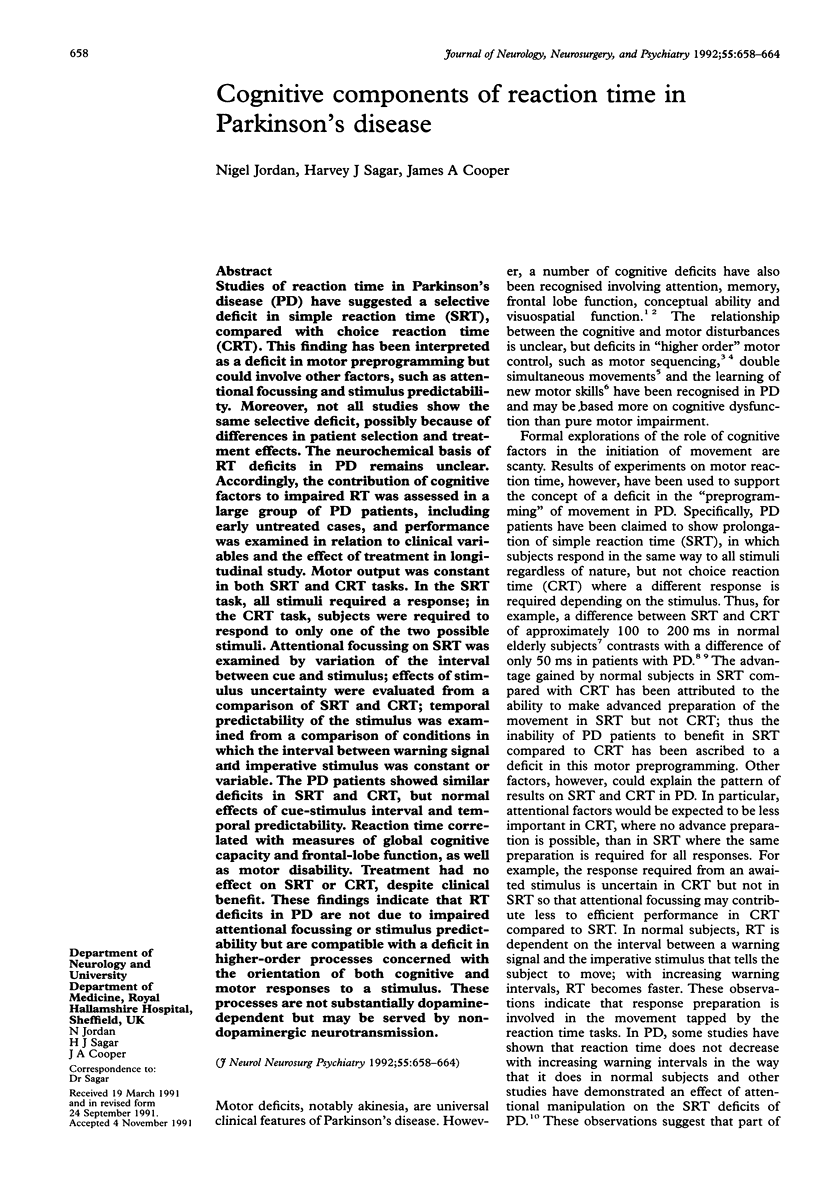
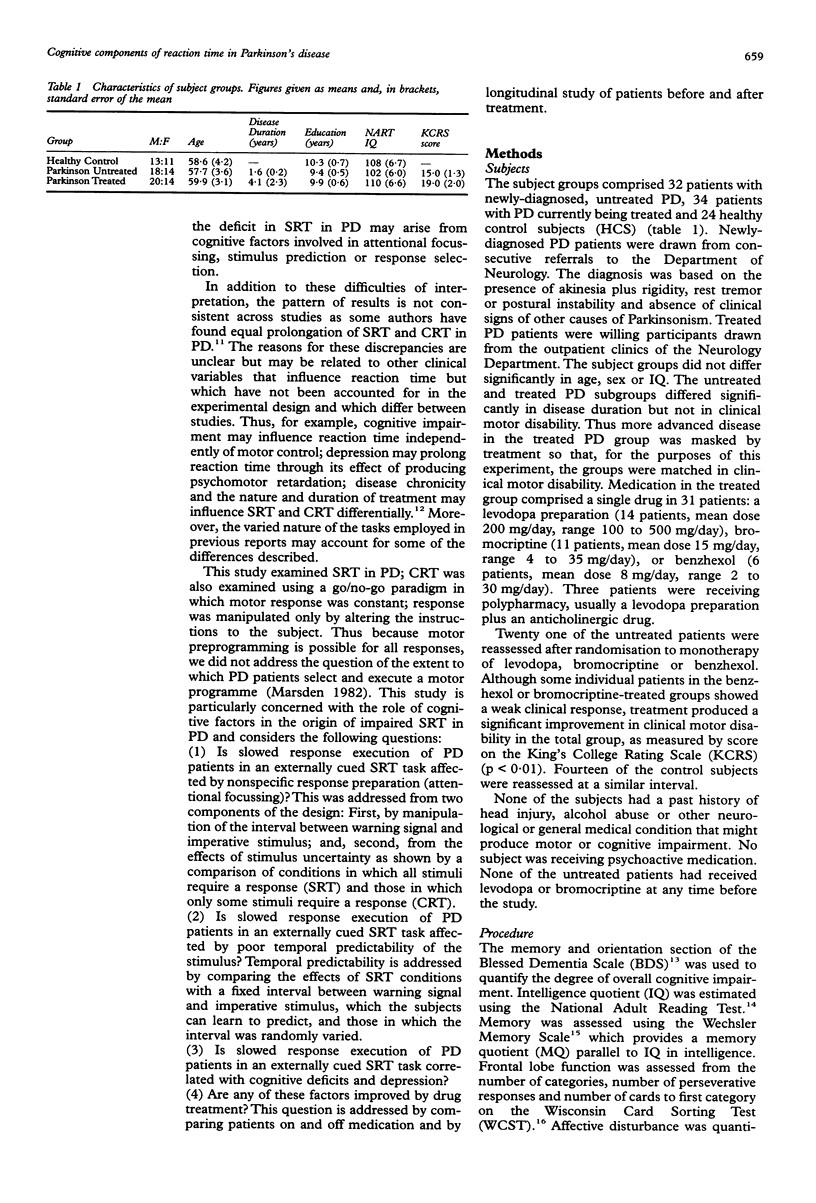
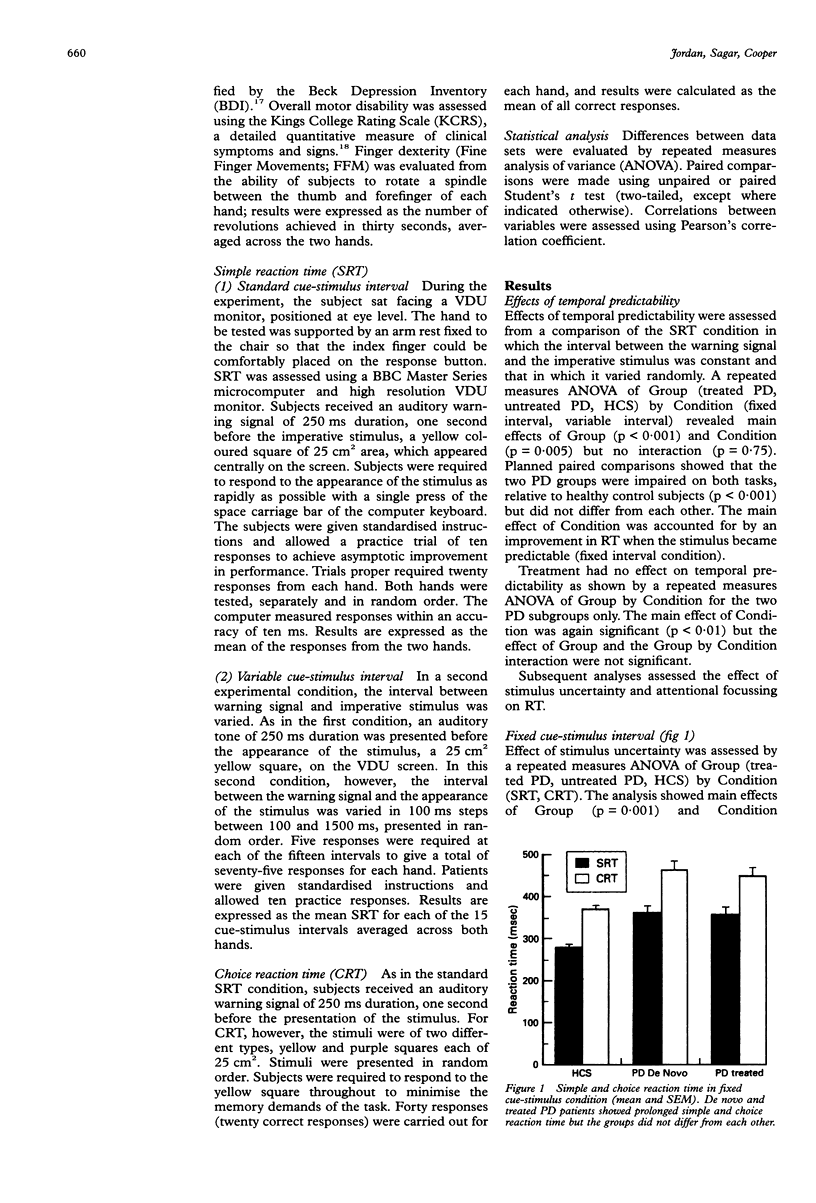
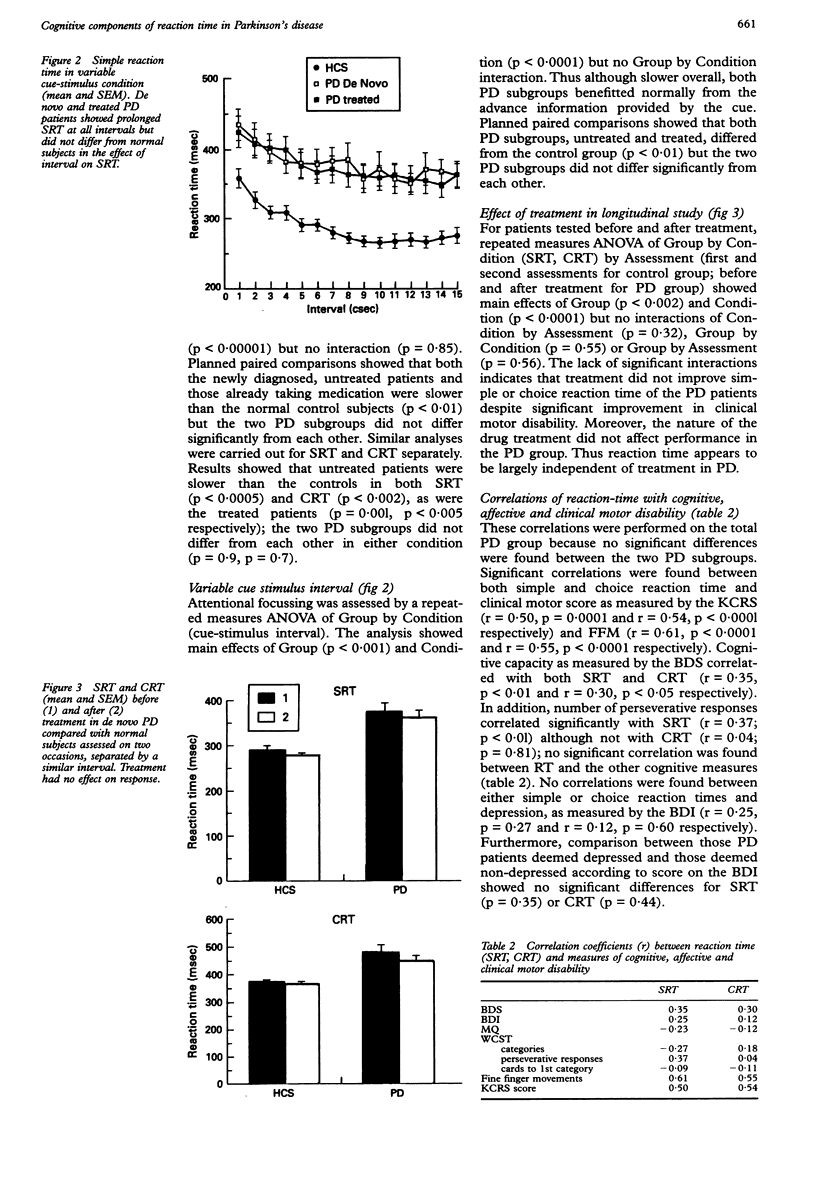
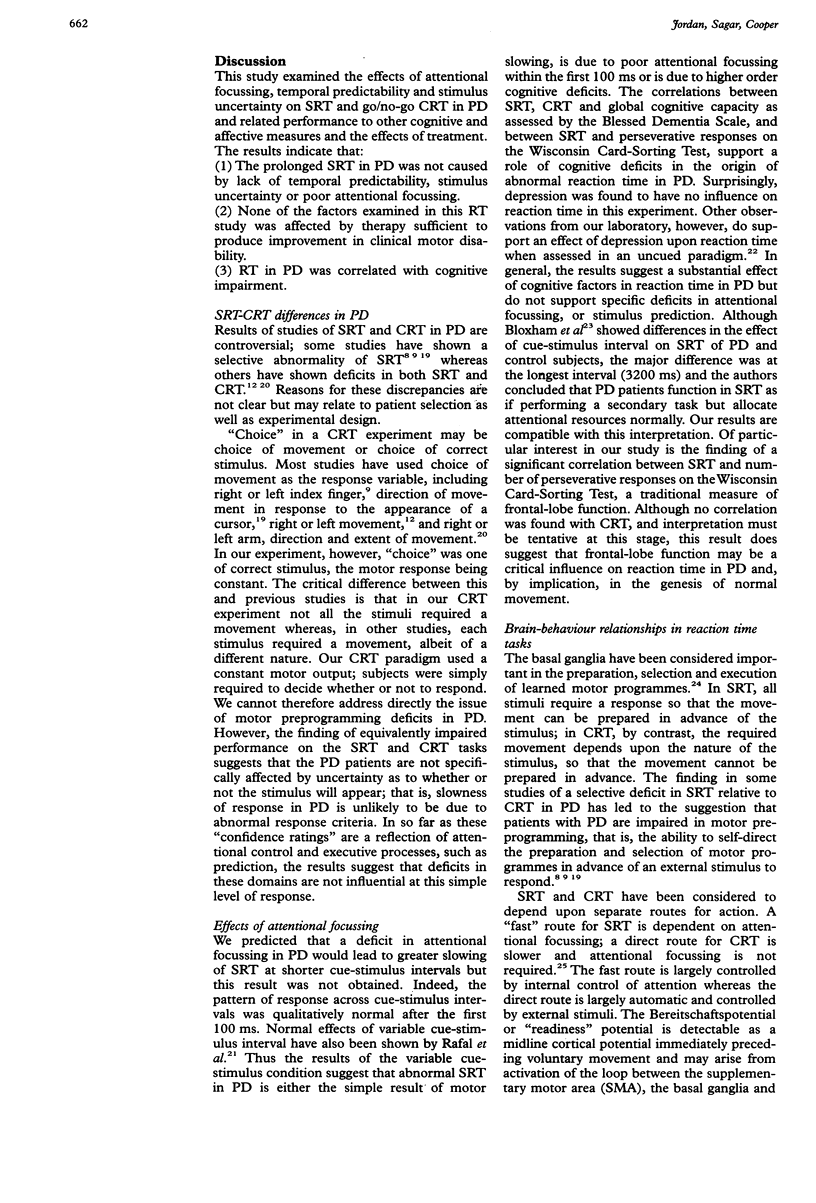
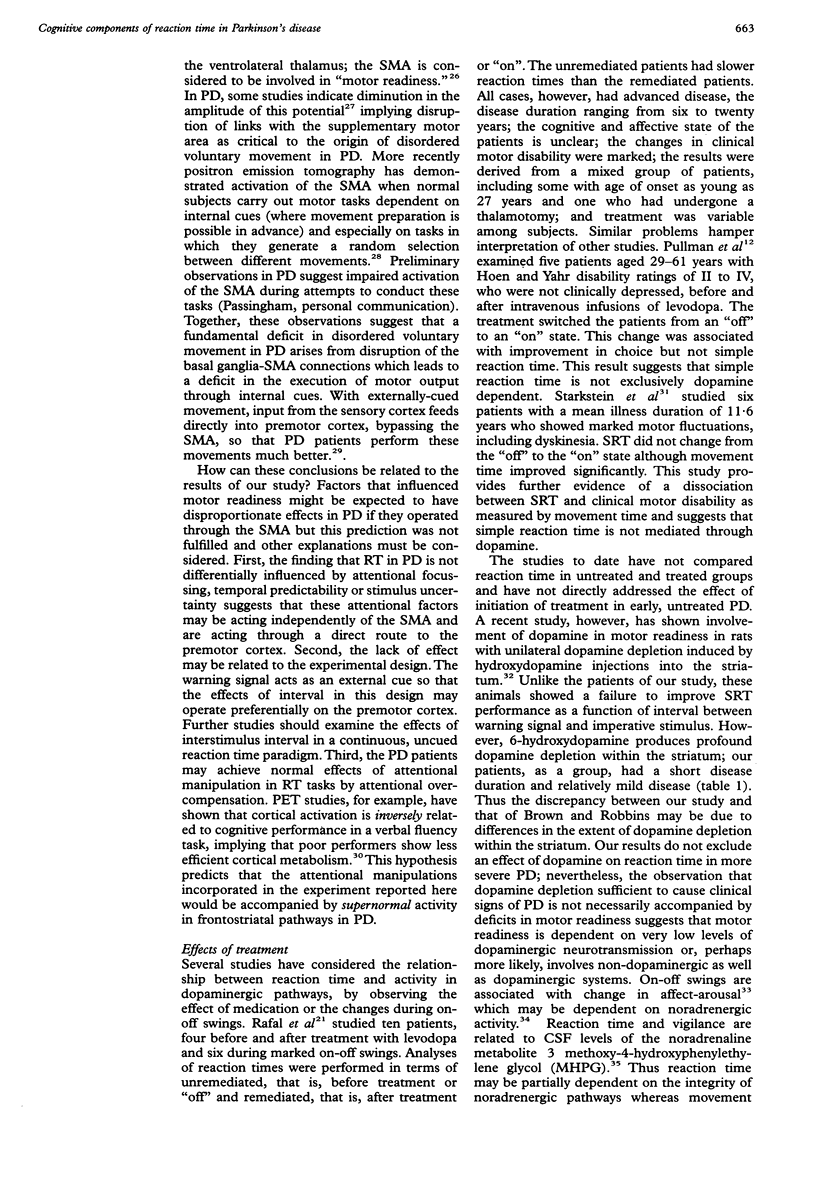
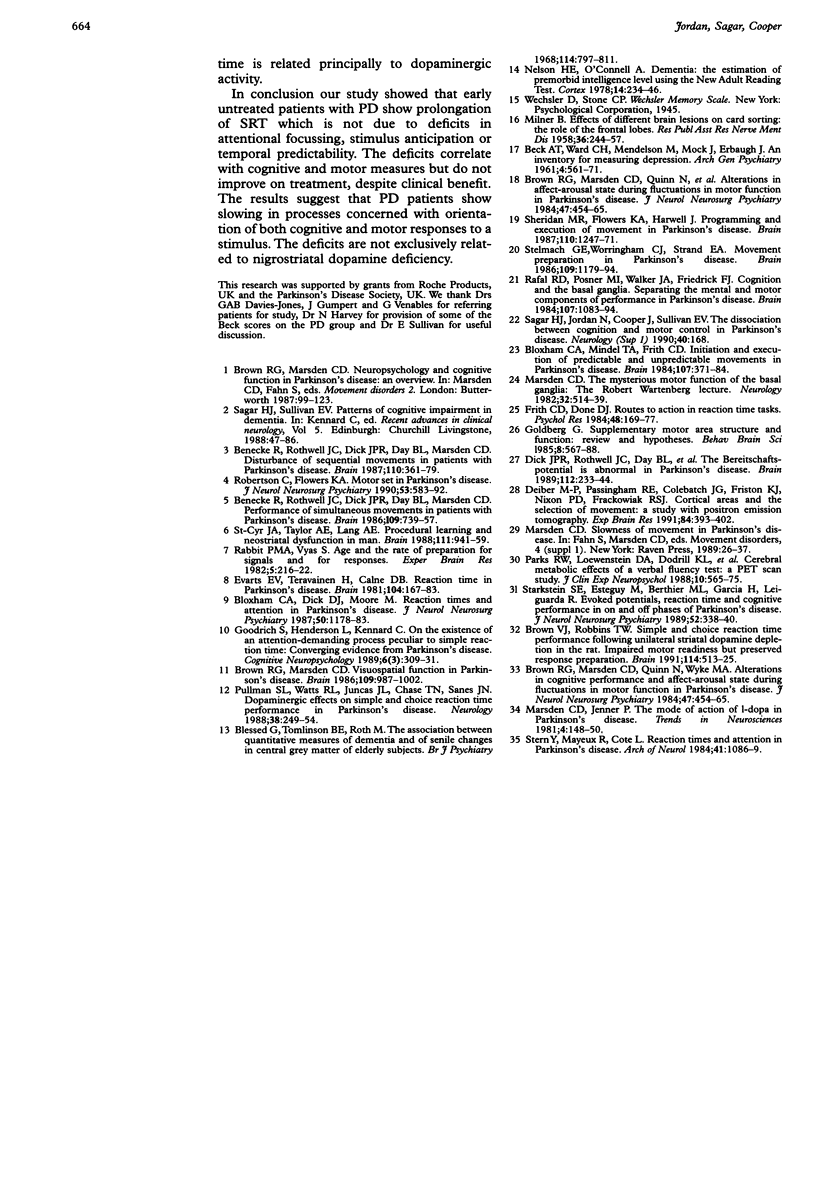
Selected References
These references are in PubMed. This may not be the complete list of references from this article.
- Benecke R., Rothwell J. C., Dick J. P., Day B. L., Marsden C. D. Disturbance of sequential movements in patients with Parkinson's disease. Brain. 1987 Apr;110(Pt 2):361–379. doi: 10.1093/brain/110.2.361. [DOI] [PubMed] [Google Scholar]
- Benecke R., Rothwell J. C., Dick J. P., Day B. L., Marsden C. D. Performance of simultaneous movements in patients with Parkinson's disease. Brain. 1986 Aug;109(Pt 4):739–757. doi: 10.1093/brain/109.4.739. [DOI] [PubMed] [Google Scholar]
- Bisiach E., Cornacchia L., Sterzi R., Vallar G. Disorders of perceived auditory lateralization after lesions of the right hemisphere. Brain. 1984 Mar;107(Pt 1):37–52. doi: 10.1093/brain/107.1.37. [DOI] [PubMed] [Google Scholar]
- Blessed G., Tomlinson B. E., Roth M. The association between quantitative measures of dementia and of senile change in the cerebral grey matter of elderly subjects. Br J Psychiatry. 1968 Jul;114(512):797–811. doi: 10.1192/bjp.114.512.797. [DOI] [PubMed] [Google Scholar]
- Brown R. G., Marsden C. D., Quinn N., Wyke M. A. Alterations in cognitive performance and affect-arousal state during fluctuations in motor function in Parkinson's disease. J Neurol Neurosurg Psychiatry. 1984 May;47(5):454–465. doi: 10.1136/jnnp.47.5.454. [DOI] [PMC free article] [PubMed] [Google Scholar]
- Brown R. G., Marsden C. D., Quinn N., Wyke M. A. Alterations in cognitive performance and affect-arousal state during fluctuations in motor function in Parkinson's disease. J Neurol Neurosurg Psychiatry. 1984 May;47(5):454–465. doi: 10.1136/jnnp.47.5.454. [DOI] [PMC free article] [PubMed] [Google Scholar]
- Brown R. G., Marsden C. D. Visuospatial function in Parkinson's disease. Brain. 1986 Oct;109(Pt 5):987–1002. doi: 10.1093/brain/109.5.987. [DOI] [PubMed] [Google Scholar]
- Brown V. J., Robbins T. W. Simple and choice reaction time performance following unilateral striatal dopamine depletion in the rat. Impaired motor readiness but preserved response preparation. Brain. 1991 Feb;114(Pt 1B):513–525. doi: 10.1093/brain/114.1.513. [DOI] [PubMed] [Google Scholar]
- Deiber M. P., Passingham R. E., Colebatch J. G., Friston K. J., Nixon P. D., Frackowiak R. S. Cortical areas and the selection of movement: a study with positron emission tomography. Exp Brain Res. 1991;84(2):393–402. doi: 10.1007/BF00231461. [DOI] [PubMed] [Google Scholar]
- Evarts E. V., Teräväinen H., Calne D. B. Reaction time in Parkinson's disease. Brain. 1981 Mar;104(Pt 1):167–186. doi: 10.1093/brain/104.1.167. [DOI] [PubMed] [Google Scholar]
- Frith C. D., Done D. J. Routes to action in reaction time tasks. Psychol Res. 1986;48(3):169–177. doi: 10.1007/BF00309165. [DOI] [PubMed] [Google Scholar]
- Nelson H. E., O'Connell A. Dementia: the estimation of premorbid intelligence levels using the New Adult Reading Test. Cortex. 1978 Jun;14(2):234–244. doi: 10.1016/s0010-9452(78)80049-5. [DOI] [PubMed] [Google Scholar]
- Parks R. W., Loewenstein D. A., Dodrill K. L., Barker W. W., Yoshii F., Chang J. Y., Emran A., Apicella A., Sheramata W. A., Duara R. Cerebral metabolic effects of a verbal fluency test: a PET scan study. J Clin Exp Neuropsychol. 1988 Oct;10(5):565–575. doi: 10.1080/01688638808402795. [DOI] [PubMed] [Google Scholar]
- Pullman S. L., Watts R. L., Juncos J. L., Chase T. N., Sanes J. N. Dopaminergic effects on simple and choice reaction time performance in Parkinson's disease. Neurology. 1988 Feb;38(2):249–254. doi: 10.1212/wnl.38.2.249. [DOI] [PubMed] [Google Scholar]
- Rabbitt P., Vyas S. Age and the rate of preparation for signals and for responses. Exp Brain Res. 1982;Suppl 5:216–222. doi: 10.1007/978-3-642-68507-1_30. [DOI] [PubMed] [Google Scholar]
- Rafal R. D., Posner M. I., Walker J. A., Friedrich F. J. Cognition and the basal ganglia. Separating mental and motor components of performance in Parkinson's disease. Brain. 1984 Dec;107(Pt 4):1083–1094. doi: 10.1093/brain/107.4.1083. [DOI] [PubMed] [Google Scholar]
- Robertson C., Flowers K. A. Motor set in Parkinson's disease. J Neurol Neurosurg Psychiatry. 1990 Jul;53(7):583–592. doi: 10.1136/jnnp.53.7.583. [DOI] [PMC free article] [PubMed] [Google Scholar]
- Saint-Cyr J. A., Taylor A. E., Lang A. E. Procedural learning and neostriatal dysfunction in man. Brain. 1988 Aug;111(Pt 4):941–959. doi: 10.1093/brain/111.4.941. [DOI] [PubMed] [Google Scholar]
- Sheridan M. R., Flowers K. A., Hurrell J. Programming and execution of movement in Parkinson's disease. Brain. 1987 Oct;110(Pt 5):1247–1271. doi: 10.1093/brain/110.5.1247. [DOI] [PubMed] [Google Scholar]
- Starkstein S. E., Esteguy M., Berthier M. L., Garcia H., Leiguarda R. Evoked potentials, reaction time and cognitive performance in on and off phases of Parkinson's disease. J Neurol Neurosurg Psychiatry. 1989 Mar;52(3):338–340. doi: 10.1136/jnnp.52.3.338. [DOI] [PMC free article] [PubMed] [Google Scholar]
- Stelmach G. E., Worringham C. J., Strand E. A. Movement preparation in Parkinson's disease. The use of advance information. Brain. 1986 Dec;109(Pt 6):1179–1194. doi: 10.1093/brain/109.6.1179. [DOI] [PubMed] [Google Scholar]
- Stern Y., Mayeux R., Côté L. Reaction time and vigilance in Parkinson's disease. Possible role of altered norepinephrine metabolism. Arch Neurol. 1984 Oct;41(10):1086–1089. doi: 10.1001/archneur.1984.04050210084021. [DOI] [PubMed] [Google Scholar]
- Willer J. C., Barranquero A., Kahn M. F., Sallière D. Pain in sciatica depresses lower limb nociceptive reflexes to sural nerve stimulation. J Neurol Neurosurg Psychiatry. 1987 Jan;50(1):1–5. doi: 10.1136/jnnp.50.1.1. [DOI] [PMC free article] [PubMed] [Google Scholar]



